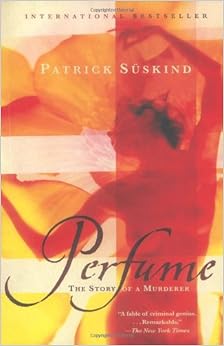Review: Perfume - The Story of a Murderer, by Patrick Süskind
 |
| Perfume: The Story of a Murderer, by Patrick Süskind This ed: 2001 Vintage | 255pp |
In 1985, Süskind published what would become his best-known work internationally: Perfume: The Story of a Murderer. And while little has been seen of, or from, the author since the novel's publication (and subsequent translation from the original German, plus a feature film in 2006) one is certain that within this medium lies his greatest strength; it's a kind of magical realism that pulls on the source of endless memories, and which relentlessly binds the reader to that world.
Jean-Baptiste Grenouille, born into abandonment with no scent of his own, carves his way through life in pursuit of what one can only call the scent of pure love - that essence which he has been denied since before his untimely birth. This is not simply a novel about that fifth sense to which the title alludes, but about a man for whom that sense is so keen, and whose beacon of purpose shines so brightly, that the reader cannot help but urge him on to the finale. The protagonist (though I almost hesitate to call him that) is not your average serial killer, and his story certainly borders on the unusual.
Süskind's intoxicating prose is embellishment itself - labeling each and every scent of the world as if the olfactory genius is recalling them by scientific name and spitting them out like ticker tape onto the page. This kind of barrage of words might seem affronting, but in Suskind's hand it's magical and enticing. The words race towards the climax which is nothing short of a literal orgy which Grenouille has induced.
The film adaptation (which stars Ben Whishaw, and features Alan Rickman, Dustin Hoffman and Rachel Hurd-Wood) is a visual stunner that develops some of the finer points of Grenouille's education very nicely but, without the omniscient prose of the novel, much of the richness and detail is lost in the medium translation. One countdown (Laure's approaching birthday) is replaced with another (the 13 essences) more effective device, bringing things to a conclusion more swiftly, but losing delicate layers of aromatic ambience that make the novel shine. The film is a splendid portrayal of scent as a medium, but the novel is significantly more gratifying, and far more varied and interesting a feast for the consumer.

Comments
Post a Comment
Any and all feedback is welcome - thanks for taking the time!